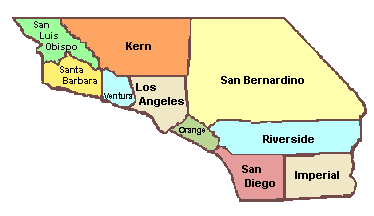Note: Since this article was published there have been developments which are noted in updates in this article, including the update near the end of the article discussing the outcome and rankings of the staff evaluation of cannabis business applicants, and the quick appeal process from that evaluation.
The County of Riverside, California, first initiated the development of cannabis regulations in March 2018 – see Riverside County Takes Next Step Toward Legalization of Cannabis Businesses. On October 23, 2018, the Riverside County Board of Supervisors approved comprehensive commercial regulations permitting cannabis businesses largely consistent with the original recommendations from March 2018 – see the Riverside County Cannabis Regulations.
Rather than place a cannabis tax measure on the Riverside County ballot for November 2018, the Board of Supervisors mandated that each commercial cannabis business enter into a separately negotiated Cannabis Development Agreement.
On December 26, 2018, Riverside County began taking cannabis applications for commercial cannabis manufacturing, distribution, testing laboratories, and wholesale cannabis nurseries only.
Although there are zoning and locational restrictions for these cannabis uses, there is no deadline to apply or limitation on how many permits can be issued in these categories. Further, Riverside County’s standard conditional use permit application process will apply to cannabis businesses with the same fee structure as any other general conditional use permit. See Riverside Planning Development Fee Schedule and read more about Riverside County Development Applications.
Riverside County banned outdoor cannabis cultivation (section 17.302.090), however, it permitted outdoor cannabis wholesale nurseries (section 17.302.130), subject to zoning and regulation – see Riverside County Cannabis Cultivation Regulations.
Riverside County did not define “wholesale nurseries.” California Business and Professions Code section 26100 (aj) provides “”Nursery” means a licensee that produces only clones, immature plants, seeds, and other agricultural products used specifically for the propagation and cultivation of cannabis.” The State law definition is applicable as Riverside County requires a California state cannabis license. See section 17.302.060 of the Riverside County Cannabis Regulations.
Cannabis Retail Sales, Cultivation Activity, and Microbusinesses were specifically excluded from the December 26, 2018 cannabis application process. On January 30, 2019, Riverside County invited pre-registration for commercial cannabis cultivation or retail sales activity, including cannabis microbusinesses. Only cannabis business applicants who submitted a Pre-Registration Form by February 15, 2019 will be permitted to submit proposals for cannabis cultivation or retail sales. During the first year, Riverside County will only permit 19 or less Cannabis Retail Sales and/or 50 or less Cannabis Cultivation Activity businesses. Riverside County will schedule meetings for the pre-registered cannabis business applicants to assist in the preparation of proposals which will be reviewed and scored. The scoring system will be provided to the pre-registered applicants by County staff. Ultimately, the Board of Supervisors will award the final cannabis business permits, subject to applicable land use approvals. No timeline has been provided for this process. See the Riverside County Cannabis Implementation Process.
[UPDATE: On March 5, 2019, the Riverside County Planning Department presented a Cannabis Request for Proposal (“RFP”) Workshop which described the process and timeline for pre-registered commercial cannabis cultivation, retail, and microbusinesses (“Interested Parties”). See the RFP slideshow presentation from the Cannabis Request for Proposals workshop by the County of Riverside. The County received 118 cannabis retail applications, 62 cannabis cultivation applications, and 65 cannabis microbusiness applications. The RFP response submittal deadline is 4 pm, April 12, 2019. Currently, it is anticipated that the Board of Supervisors will award the final 19 cannabis retail permits and 50 cannabis cultivation permits, subject to applicable land use approvals, on or about June 25, 2019. The scoring system for the Request for Proposals is set forth in the instructions provided for each type of cannabis RFP including the Request for Proposals for Cannabis Retailers, the Request for Proposals for Cannabis Cultivation, the Request for Proposals for Cannabis Microbusinesses (these RFPs were revised by Riverside County on March 20, 2019).]
Mobile cannabis delivery continues to be banned in Riverside County – see section 9.64.050 of the Riverside County Cannabis Delivery Regulations. However, licensed commercial cannabis retailers, including non-storefront retailers, may provide cannabis delivery consistent with California state law (read more about California Cannabis Law). See section 17.302.200(D) of the Riverside County Cannabis Regulations. Under the new permanent California Cannabis Regulations issued by the state cannabis licensing authorities, this will permit licensed cannabis retailers to deliver cannabis statewide regardless of local regulations. See BCC Regulations to Permit California Cannabis Delivery Statewide as well as California Business and Professions Code Section 26090(e).
Cannabis microbusinesses are specifically authorized by Riverside County’s new commercial cannabis regulation. See section 17.302.230 of the Riverside County Cannabis Regulations. A microbusiness is required to have a minimum of three of four commercial cannabis uses (retail sales, cultivation activity, distribution, or manufacturing). See section 17.302.240(C)(4) of the Riverside County Cannabis Regulations.
Lastly, Riverside County is also permitting restricted temporary cannabis events. See section 17.302.250 of the Riverside County Cannabis Regulations.

Riverside County is one of the largest counties in California, encompassing 7,300 square miles of river valleys, low deserts, mountains, foothills and rolling plains ranging from the Greater Los Angeles area to the Arizona border. Geographically, Riverside County has a Mediterranean climate in the western portion, but is mostly desert in the central and eastern portions. The unincorporated areas of Riverside County comprise about 6,375 square miles. Riverside County is the 4th most populous county in California with over 2 million residents. The County contains 28 incorporated cities. More than three-quarters of Riverside County’s land area lies outside these municipalities, as does 16 percent of the population.
UPDATE: June 19, 2019 – Riverside County Update regarding Retail, Cultivation and Microbusiness selection process. The paragraphs below are an update on the Riverside County cannabis selection process.
On June 17, 2019, the County of Riverside Planning Staff released the list ranking results for cannabis retail, cultivation, and microbusinesses. The County received 71 complete applications for cannabis retail, 30 complete applications for cannabis cultivation (indoor only), and 18 complete applications for cannabis microbusinesses. See the Cannabis Business Ranking Results for Riverside County.
County staff ranked 23 retail businesses to proceed to the next phase of cannabis licensing. Although the County is limiting retail cannabis businesses to 19, some of the applicants are within 1000 feet of each other which is a violation of the Riverside County Code, therefore the County staff is recommending all 23 cannabis businesses have the opportunity to process. The first applicant that receives approval from the Board of Supervisors will obtain a cannabis permit and any subsequent applicant within 1000 feet of the permitted business will not be awarded a permit.
As the County received only 30 completed cannabis cultivation applications, all of the applications are being recommended to proceed without a ranking by staff. The Board of Supervisors authorized up to 50 cannabis cultivation permits in the first year.
All cannabis microbusiness applications were considered as cannabis cultivation applications for the purposes of ranking even though most of the applications included a retail component as well. However, three of the microbusiness applicants were for properties located within 1000 feet of a ranked retail applicant location so they were ranked with the retail applicants and are not being recommended to proceed with the process. The other 15 cannabis microbusiness applicants are being recommended to proceed.
Unsuccessful cannabis business applicants do have an opportunity to appeal the County’s ranking recommendations no later than noon on Monday, June 24, 2019. The appeal must be received via email or hand-delivery by noon. A postmark will not be sufficient. The grounds for appeal are limited to: a) the RFP or its exhibits were ambiguous or inconsistent in a materially significant way and such ambiguity or inconsistency gave the selected Proposer(s) an unfair competitive advantage; or b) the selection process was unfair in that the County failed to follow the stated selection process which gave an unfair competitive advantage to the selected Proposer(s) and the selection process was not modified or waived pursuant to the RFP.
Staff recommendations will be presented to the Board of Supervisors on July 2, 2019. Once approved, the successful cannabis applicants will have 120 days to submit a conditional use permit package and Development Agreement with the County. After October 30, 2019, at 5 p.m., the County will not accept any conditional use permits for cannabis retail, cultivation or microbusiness from the applicants approved by the Board of Supervisors on July 2, 2019.
Contact us to learn more about Riverside cannabis licensing and regulation as well as California state, county or city cannabis licensing and regulations, cannabis regulatory compliance, and cannabis litigation.

